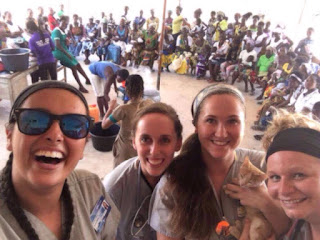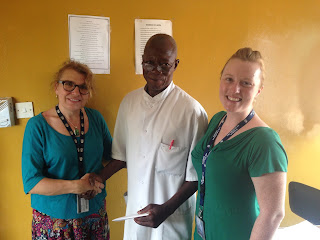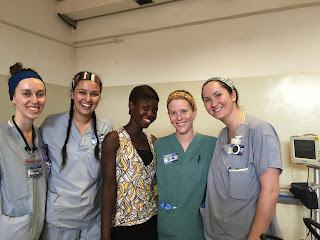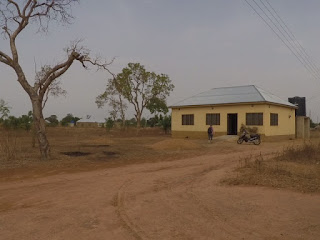 |
| Chanshegu Clinic |
Chanshegu is a rural village located in northern Ghana, just outside of Tamale. There is very limited access to healthcare resources in this village and as a result, many preventable deaths occur. In addition, the hospital is located some distance away so people are unable to receive medical care in time. In 2013, nursing students from UBCO started the initiative to build and fund a healthcare clinic in this rural village that will allow its residents to have access to healthcare resources. Once the clinic is up and running, many services will be provided such as maternity and well baby checkups, immunizations for children, and routine public health screenings. It will be awhile before it is commissioned by Ghana Health Services, but Jeanette and Maggie started the process by providing funds to secure the land title, and register the clinic in Accra. These funds were raised by a group of fourth year students (including Harveer). The funds were also used to purchase an examination bed, maternity bed, standing scale, hanging scale, delivery kit, benches, and some very basic supplies. Harveer was able to purchase and deliver the equipment and supplies and set up the clinic with a group of students. Yay! We had it all ready by Thursday afternoon.
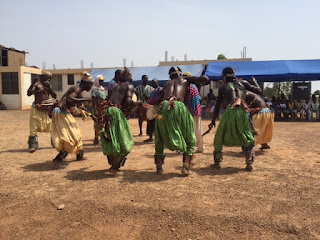 |
| Traditional dancers doing their thing! |
 |
| Canadians trying to keep up... |
Last Friday we held the very first community health screening at the clinic! Upon arrival, we were warmly welcomed by the residents of Chanshegu. We had the opportunity to meet both the Chief and the village's respected elders, as well as sit front row for three cultural dances. The dances were performed to celebrate the opening day of the clinic. The traditional style dances and music consisted of drums, beads, colourful clothing, singing, and a range of movements. We even got to participate in the final dance!! YAY! We had such an incredible time trying to learn the various traditional dance moves and the people had an entertaining time laughing at our dance moves. We are grateful to have received such a warm welcome in Chanshegu and had a beautiful start to our very jam packed day!
 |
| The Chief - Our first Client |
We knew very little about what to expect when running and organizing a health screening clinic for the day, but we worked together as a team successfully. We set up tents and chairs just outside the clinic and had three stations set up to record each individual's blood pressure and health concerns. Those individuals that needed to be seen by the lovely Nurse Practitioner, Francis, were sent into the clinic and waited to be seen. There was also a newly graduated mid-wife, Joanna, who assessed all the pregnant women. As nurses, we triaged the people according to their blood pressure readings, blood glucose results, accompanying symptoms, and whether they were pregnant or not. The most challenging part was the language barrier and trying to get someone to translate in order to provide education or information. The Chief was our first client. He expresses his gratitude to everyone back home who has contributed so generously to his village and this project.
 |
| The Community waiting for screening |
Overall, the day was a HUGE success and we saw about 350 people! We even had time to play soccer and other activities with the children of the village.
From here, Dr. Sumed (an obstetrician at Tamale Teaching Hospital) and some volunteer midwives and NPs will begin working with Ghana Health Services to provide antenatal care, child welfare clinics and health talks. They will start small, and grow as they are able. After 5 years of tireless fundraising and perseverance, waiting for the right people to come together, the clinic will begin! It feels good.
 |
| Playing soccer with these beautiful children |
After a long but fulfilling day, we loaded the bus and headed to Dr. Vida Yakong's house, who graciously opened her home to all of us for dinner. Their hospitality was much appreciated after a long day in the sun! We were blessed to have cold drinks, a delicious dinner, and even ice cream for dessert. The fellowship, laughs, and stories made for a great night! It was also Carmen's birthday, so we all serenaded her by singing happy birthday and celebrating together. And we FINALLY convinced Francis to sing for us and he was amazing!
Posted by Megan Lentz and Harveer Pooni










